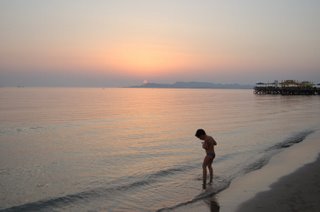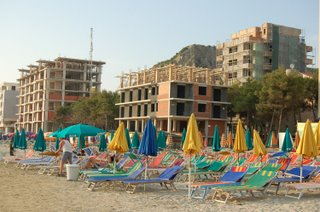I just came back from a short trip to Albania. We drove from Prishtina through Macedonia and finally across Albania to the city of Durres in the Adriatic. It is only a 10 hours drive, but it was a very interesting experience, with my Albano-Kosovar trip mates telling me how some of them drove these same roads as refuges in 1999 when trying to escape from the war with Serbia, having to wait at the Macedonian border for days.
Only a 10 hour drive (and 10 more on the way back), but a lot of stamps in my passport and some border anecdotes:
On the way there, we got stuck at the Macedonia-Albania border for more than one hour because of a power cut that had shut down the computers. Border police stood the complaints, ironic suggestions and jokes of the people waiting in the burning sun with patience and good humor, chatting and smoking with everybody. When it was finally our turn, the civil servant kept asking our driver, -with my Spanish passport in his hand- if I was Albanian or could speak Albanian in an attempt to save me the 10 Euros fare every foreigner has to pay when entering the country (this is a curious fare supposedly for non Albanians, but seems to apply only to non Albanian speakers). I’m sure I will daydream about this anecdote in my next passport control experience at Heathrow or JFK airports…
On the way back home, the Kosovar border police checking our passports called me out of the car. I got out ready for the typical series of questions about “the purpose of my visit” and so on, but the serious-looking policeman flagged my Spanish passport in my face and shot a single question: “Who are you with in football?” Even I am a complete ignorant in Spanish football (and football in general), by now and with the World Cup being broadcasted every day in the screens of every bar and house of the Balkans, I know my lesson well: “Barcelona!” I shouted out enthusiastically. The policeman smiled and shook my hand saying: “Good, good, then you can go”.

Albania is a country of contrasts and unfinished buildings.
As we were driving across the country, one of my Albanian travel mates was pointing at the hundreds of never finished buildings topped with the national flag that fill in the landscape and saying with a smile: “Albanians are optimistic people. They start building their houses when things seem to go better, but there’s never money enough to finish them”
With an economy traditionally agriculture based, this ex-communist country starts to show the “benefits” of capitalism and international intervention. Albania is still one of the poorest countries in Europe, but its capital, Tirana shows some of what at the eyes of Westerners is usually considered indisputable signs of progress and modernity; things like food chains, big expensive-looking new governmental buildings and a lot of construction being done everywhere by American-branded Caterpillar bulldozers. While I admire all that, about 5 different kids not older than 9 approach our group (Kosovar students in a study visit) selling anything from candy to cigarettes. One of my Kosovar friends tells me that the city is full of these street kids that live from charity; but, before I can inquire more about them, one of the well-dressed private security guards of a nearby official building washes the kids away…

On the coast of the Adriatic, the city of Durres and its port have a long history of occupations, political turmoil and resistance. During the past nine centuries Durres has changed hands from one ruler to another more than 30 times and has participated in several uprisings. Some of the most recent: In 1939, Durres became the center of the resistance to the Italian Fascist forces that had occupied the country, and in 1942 the Albanian National Liberation Council was formed in the city. In August, 1943, the city was taken by the Germans, which blew up the port in 1944.
All this history coexists today with the epidemic of uncontrolled, fast construction that has turned the beaches around the city into that:

I spent some afternoons on the beach, with the monster-like forms of the buildings under construction right on my back, reviewing Michael Albert’s book PARECON, life after capitalism. My little symbolic act of resistance in this new paradise for the western and eastern Europe free-market sharks.
Check out all my pictures from the trip to Albania, and some new pictures from Prishtina here.




0 Comments:
Post a Comment
<< Home